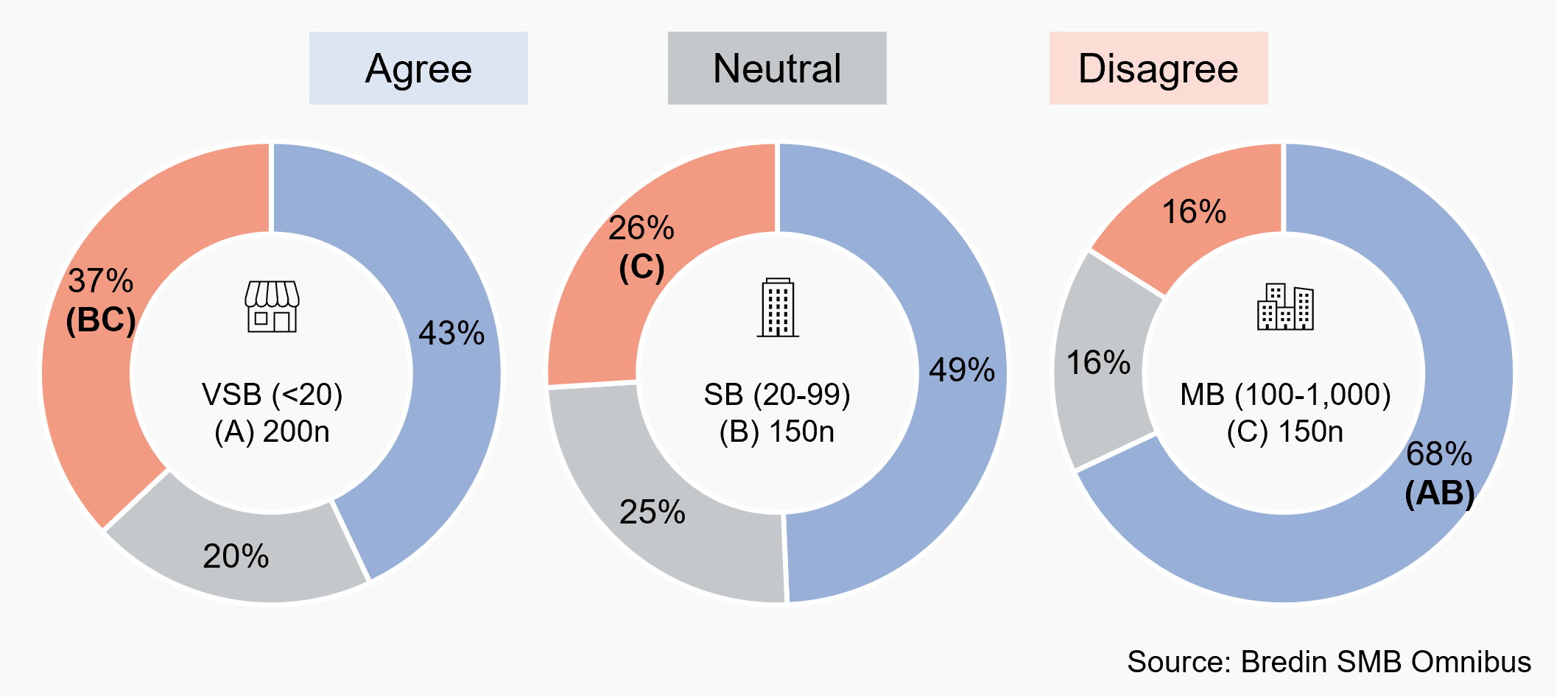How SMBs Feel About Tariffs
March 13, 2025
We just closed a survey of 500 U.S. SMBs to find out how they feel about the tariffs that have already been enacted and that may yet happen.
SMBs have mixed feelings about tariffs. For example, 44% of very small businesses (VSBs, with 1-19 employees), 54% of small businesses (SBs, with 20-99 employees) and 51% of midsized businesses (MBs, with 100-1,000 employees) agree somewhat or strongly that tariffs will have a negative effect on their business. At the same time, 45% of VSBs, 49% of SBs, and 68% of MBs support tariffs as a way to protect domestic industries.
Tariffs will have a negative effect on my business

Respondent opinions on tariffs hurting their business differ strongly by age: 59% of 18 to 44-year-olds agree tariffs are harmful, significantly more than the 41% of 45 to 60-year-olds and the 38% of those over 60. Political affiliation also shows a strong skew, with 61% of Democrats agreeing, versus 41% of Independents and 30% of Republicans.
While more than half of all three segments are concerned about the impact of tariffs on their operating costs, VSBs are much less concerned about it than SBs and MBs.
Tariffs will increase our operating costs

Support for tariffs to protect domestic industries is significantly higher among MBs than VSBs and SBs. Tariff support also varies meaningfully by:
- Political affiliation: Of all demographics, support for tariffs is highest among Republicans (72%) – much more so than among Independents (45%) and Democrats (13%).
- Gender: Support for tariffs is one of the few areas where there is a meaningful gender divide, with 48% of men versus 38% of women in favor.
- Region: Tariff support is much higher in the South (47%) and Midwest and Northeast (46%) than in the West (28%).
I support tariffs as a way to protect domestic industries

More than half of respondents agree that tariffs hurt small businesses more than they hurt larger businesses: 52% of VSBs, 68% of SBs and even 59% of MBs agree. There is strong disparity by age, gender, and political affiliation as well:
- Age: 72% of 18 to 44-year-olds agree, versus 49% of 45 to 60-year-olds and 43% of those over 60
- Gender: 44% of men agree, versus 60% of women
- Political affiliation: 73% of Democrats agree, versus 51% of Independents and 31% of Republicans.
Tariffs hurt small businesses like mine more than they hurt larger companies

Not surprisingly, larger SMBs are much better positioned to weather tariffs. 38% of VSBs agree their business is well-prepared to absorb the costs of tariffs, versus 55% of SBs and 71% of MBs.
My business is well-prepared to absorb the additional costs resulting from tariffs

Likewise, larger SMBs are much more likely to be exploring supply chain changes to reduce the impact of tariffs. 34% of VSBs are looking into supply chain evolution, versus 63% of SBs and 73% of MBs.
We are actively exploring changes to our supply chain in response to potential tariffs

Larger SMBs are also more likely to pass the added costs of tariffs on to their customers. 39% of VSBs plan to pass along cost increases, versus 62% of SBs and 68% of MBs. By industry group, Personal Services is least likely to pass along increased costs (25%), versus 33% of Professional Services, 45% of Retail/Wholesale, and 48% of Manufacturing.
We expect to pass some or all price increases resulting from tariffs on to our customers

Finally, larger SMBs are much more likely to foresee tariffs causing structural changes to their industry. 50% of VSBs agree that tariffs will lead to long-term changes, versus 65% of SBs and 78% of MBs. Respondent age also corresponds to belief in tariffs causing long-term industry change: 63% of 18 to 44-year-olds agree, versus 50% of 45 to 60-year-olds and 42% of those over 60.
Tariffs will lead to long-term changes in our industry

Looking for actionable SMB insight? Bredin’s global research gives you high-value insights to improve your go-to-market, product, pricing, UX, and other strategies. We also generate uniquely valuable data for high-impact content, PR, social, and sales support programs.

